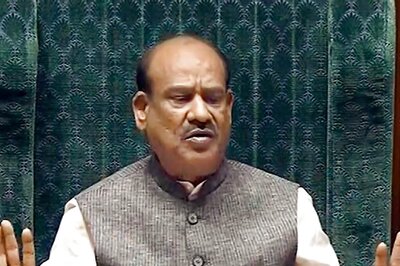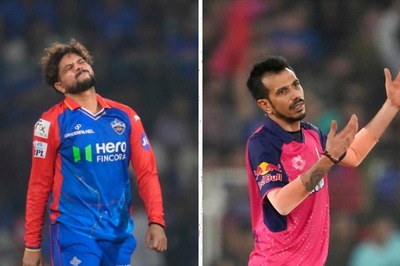
views
In post-pandemic era, Radhe: Your Most Wanted Bhai is the first big budget extravaganza to have adopted the hybrid model of release. It will be released in theatres worldwide, adhering to the COVID protocol issued by the government, and on ZEE5 with ZEE’s pay per view service ZEEPlex, and also on all leading DTH operators, giving the audience multiple options to watch the film. When Kamal Haasan had attempted to release Viswaroopam on DTH a day before its theatrical release in 2013, exhibitors went up in arms threatening to boycott his film. So, why isn’t there a similar uproar in case of Radhe?
Announcing the hybrid release decision, a spokesperson from Salman Khan Films had said, “It’s imperative that we all come together and think of out-of-the-box solutions for cinema as an industry during the current pandemic situation. We will support the theatre owners by releasing the film in as many theatres as we can, keeping in line with the rules and protocols laid down by the government. But considering the guidelines and safety measures, we also need to devise ways to ensure that the film reaches all of our audience.”
Hybrid Release was the Only Way Out
Industry insiders say that exhibitors realize that not every film can wait for theatres to reopen. Film trade analyst Taran Adarsh explains, “Salman has always brought his films on Eid every year. This year, the only way out was a hybrid release. One can say that Salman Khan is financially secure enough to delay the release, but every film has its own budget and this one has already overshot it. Looking at it from the exhibitor’s point of view, Salman Khan is the darling of the market. But if most multiplexes and theatres are shut, what do you do? The theatres could not ask him to hold on for a long time. Both parties are right, you cannot blame one or the other.”
More theatres have been shut since the release date was announced. South states, which still had films running in theatres, have had to close owing to the surge in Covid-19 cases. A very small number of theatres are still functioning, albeit with a reduced capacity.
Trade analyst Atul Mohan says, “Radhe, ’83 and Sooryavanshi are three major films that theatres had high hopes from. But exhibitors also understand that producers who have invested more than Rs 125 crores on a film, they also need to think about their profit. They waited for one year, and this was the only way out, given the current circumstances. Although the multiplexes had said that they are not going to screen the film, many single screen theatres were open when they made the announcement. Then suddenly the severity of the second wave caused more theatres to shut again and spoiled the whole plan. The hybrid model was the only way for them to make some money, and they got a good deal.”
More Films Might Adopt Hybrid Model
What adds to the anxiety of exhibitors is the fact that the success of Radhe could encourage other films to adopt a similar route. “When the hybrid model was announced, exhibitors were disappointed for sure, because this could pave the way for a lot of other films,” says Taran Adarsh, adding that we haven’t had other films announce hybrid models of release yet, because they are waiting to see the reaction to Radhe, as well as for theatres to reopen. “A production house like Yash Raj Films is waiting for cinemas to reopen. Whether more films adopt the hybrid model of release will depend on the producer’s holding capacity.”
Atul Mohan adds that this hybrid model can only work in case of a big budget film. “This is something new for India, and can only work for a big release like Salman Khan’s. The audience won’t care if a smaller film takes the hybrid route, they will watch it at home. Also, many are waiting to see the audience’s response to Radhe, on the pay-per-view platform and the buzz on social media, before deciding to follow suit,” Atul says.
ZEE5, the platform facilitating the pay-per-view model, is confident that the hybrid model benefits all stakeholders. “With the ongoing pandemic making many theatres across the country temporarily non-operational, a traditional theatrical release was not going to cut it. The multiformat strategy was devised to ensure that both the stakeholders as well as the audience benefit from this proposition. It has become increasingly difficult to predict the future with this pandemic so it is hard for me to say whether this will become an industry norm. There is a line-up of 50+ theatricals and 40+ Originals this year on ZEE5. Few of them will be multiformat simultaneous releases depending on how this situation evolves,” says Manish Kalra, Chief Business Officer, ZEE5 India.
We are all Disappointed that Radhe is not Releasing in Cinemas
While the unpredictable nature of this pandemic might lead to more films considering this option, exhibitors are hoping for a light at the end of the tunnel soon. “A Salman Khan film releasing at a time when hardly any cinemas across the country are functional is totally a body blow to the exhibition sector, but these are exceptional times, and everyone is fighting for survival. We are all disappointed that Radhe is not releasing in cinemas across the country. We hope that after Radhe, too many films do not decide to take this route and films wait for theatres to reopen. There is going to be a lot of pent-up demand once this pandemic has passed. Of course, theatres won’t be fully functional at one go, it will be a gradual opening. So these kinds of innovative formats will be there for a temporary period,” says film exhibitor Akshaye Rathi.
A huge chunk of Salman’s followers are the Tier 2 and 3 city audiences that love to whistle and dance in the theatres. Exhibitors regret that there will be no such spectacle in movie halls this Eid. Pranav Garg, owner of Maya Multiplex in Muzaffarnagar, says, “It’s a major loss for cinemas as well as die-hard fans of Salman. They are releasing the film at a time when most state governments have asked for theatres to be shut. Fans have been calling us to ask whether we are going to screen the film, and we don’t have an answer unless the authorities take a decision. We understand the producers have invested a lot of money and need to recover costs. But we’ve also been suffering losses for over a year. All we can hope for is that situation gets better soon and we can go back to screening films again.”
Read all the Latest News, Breaking News and Coronavirus News here. Follow us on Facebook, Twitter and Telegram.

















Comments
0 comment